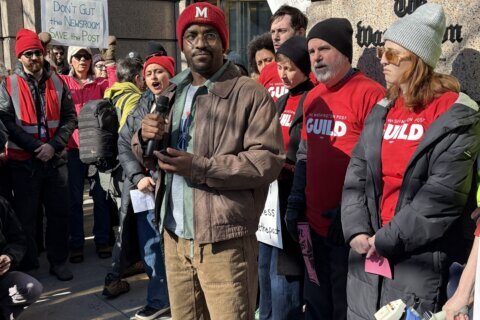D.C.’s state epidemiologist has further detailed the city’s new coronavirus quarantine and isolation guidelines, explaining DC Health advises residents to take a rapid antigen test before exiting isolation because some people may be contagious beyond five days.
In its guidance released earlier this week, DC Health said a five-day isolation period can be used if a negative antigen test is completed toward the end of the five-day period and the person is fever-free for 24 hours without using medication.
Dr. Anil Mangla, the city’s state epidemiologist, said the antigen testing plays a crucial role because “if you look at the literature, the literature says that some people, depending on your immunity, you may still be contagious after five days.”
The Centers for Disease Control and Prevention said people who test positive may test themselves before exiting isolation.
The CDC changed the isolation period from 10 days to five in December.
- Sign up for WTOP alerts
- Latest coronavirus test results in DC, Maryland and Virginia
- Latest vaccination numbers in DC, Maryland and Virginia
Looking for more information? D.C., Maryland and Virginia are each releasing more data every day. Visit their official sites here: Virginia | Maryland | D.C.
“Science and data has shown that people could still be infectious, [it’s] rare, but infectious after five days, and so that antigen test will trap and identify those individuals to make sure they’re not in a community asymptomatic and spreading the disease,” Mangla said.
In its updated guidance, D.C. said everyone 18 and older in school buildings is only considered up to date on vaccination if they’ve received a booster shot, and detailed guidelines for a test-to-stay program for unvaccinated students attending city schools.
Test-to-stay enables unvaccinated students who are exposed to the virus in a school setting to remain attending school as long as they get tested several times. Fairfax and Arlington counties in Virginia have also adopted the practice.
Mayor Muriel Bowser and D.C. Public Schools Chancellor Lewis Ferebee have also announced plans to require all students to complete antigen tests before returning to schools from long breaks, like the one scheduled later this month. The city uses a saliva-based asymptomatic testing program.
“As the mayor has made it clear, we want students to be in school,” Mangla said. “School, the one-on-one is the best opportunity for students to learn. Test-to-stay keeps COVID out of schools and it keeps students safely back in school.”
The city’s coronavirus metrics are improving, Mangla said, and are coming down from a peak around Christmas. He said the “perfect storm” of travel, more testing and unvaccinated people created the spike in community spread.
The city’s case rate at the end of December was about 2,400, he said. As of data released Thursday night, the city’s weekly case rate is 241.6.
“We’re doing great compared to where we were a month ago,” Mangla said. “But we’re still not really to a point where we should be in low transmission.”
The CDC defines “low” community transmission as fewer than 10 cases per 100,000 people.
Bowser announced last week that the city’s indoor mask mandate will remain until Feb. 28 and said officials will evaluate data before determining whether to extend it again. Mangla warned that the nature of the virus makes it difficult to predict the best time to lift public health measures.
“This virus has been very unpredictable,” Mangla said. “Right now, we’ve just been erring on the side of caution. We’re looking at our data very close, and when the time comes to make decisions, we will make those decisions.”
Mangla said when assessing risk in the current climate, D.C. residents should consider vaccination status, masking and distancing. He maintained the best way to protect against severe disease is vaccination.
Fully vaccinated people are 10-times less likely to get infected compared to those who are unvaccinated, he said.
“Vaccinations work, get fully vaccinated, get up to date,” Mangla said. “That is going to be one of the major protection factors as we come to, hopefully, the end of this pandemic.”








